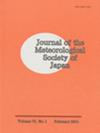Near-Global Three-Dimensional Hail Signals Detected by Using GPM-DPR Observations
IF 1.6
4区 地球科学
Q3 METEOROLOGY & ATMOSPHERIC SCIENCES
引用次数: 4
Abstract
This study proposes a method of detecting three-dimensional hail distribution by using the Global Precipitation Measurement (GPM) Dual-frequency Precipitation Radar (DPR) products in combination with the atmospheric temperature from a reanalysis product. In this study, the hail class contains hailstones, high-density graupel, and small frozen droplets. The radar reflectivity at the Ku-band (ZKu) and dual-frequency ratio (DFR) values are examined for hydrometeor classification at the five atmospheric temperature ranges in comparison to the ground radar product in a test hailstorm case. A simple model assuming binary collision for the riming process, which represents a significant reduction in the number concentration with the conservation of the mass concentration, explains well the hail signals on the scatterplot of ZKu and the DFR. This study determines the thresholds of the ZKu and DFR values at each temperature range based on the simple model. Furthermore, this study evaluates the thresholds in 74 hailstorm cases and proposes two filters to remove melting snow and rain contamination below the freezing level. The 5-year dataset of the GPM-DPR observations shows that hail is widely distributed over oceanic convergence zones as well as over continental convective regions. Most oceanic hail layers are found to be thin (i.e., less than 1500 m) and confined near the freezing level. Therefore, such hail signals have been potentially missed by ground observations. An additional filter removes such thin hail layers and effectively works to detect only deep hailstorms, specifically over continental regions.利用GPM-DPR观测探测近全球三维冰雹信号
本文提出了一种利用全球降水测量(GPM)双频降水雷达(DPR)产品结合再分析产品的大气温度来探测三维冰雹分布的方法。在本研究中,冰雹类别包括冰雹、高密度霰和小冰冻液滴。在5个大气温度范围内,利用雷达反射率(ZKu)和双频比(DFR)值与地面雷达产品进行了水流星分类的比较。一个简单的二元碰撞模型可以很好地解释ZKu和DFR散点图上的冰雹信号,该模型代表了数量浓度的显著降低和质量浓度的守恒。本研究基于简单模型确定了各温度范围内ZKu和DFR值的阈值。此外,本文还对74个雹暴案例的阈值进行了评估,并提出了两种去除融雪和低于冰点的雨水污染的过滤器。GPM-DPR观测的5年数据集表明,冰雹广泛分布在海洋辐合区和大陆对流区。大多数海洋冰雹层被发现很薄(即小于1500米)并且被限制在冰点附近。因此,地面观测可能会错过这种冰雹信号。一个额外的过滤器可以去除如此薄的冰雹层,有效地探测深度冰雹,特别是在大陆地区。
本文章由计算机程序翻译,如有差异,请以英文原文为准。
求助全文
约1分钟内获得全文
求助全文
来源期刊
CiteScore
6.70
自引率
16.10%
发文量
56
审稿时长
3 months
期刊介绍:
JMSJ publishes Articles and Notes and Correspondence that report novel scientific discoveries or technical developments that advance understanding in meteorology and related sciences. The journal’s broad scope includes meteorological observations, modeling, data assimilation, analyses, global and regional climate research, satellite remote sensing, chemistry and transport, and dynamic meteorology including geophysical fluid dynamics. In particular, JMSJ welcomes papers related to Asian monsoons, climate and mesoscale models, and numerical weather forecasts. Insightful and well-structured original Review Articles that describe the advances and challenges in meteorology and related sciences are also welcome.

 求助内容:
求助内容: 应助结果提醒方式:
应助结果提醒方式:


